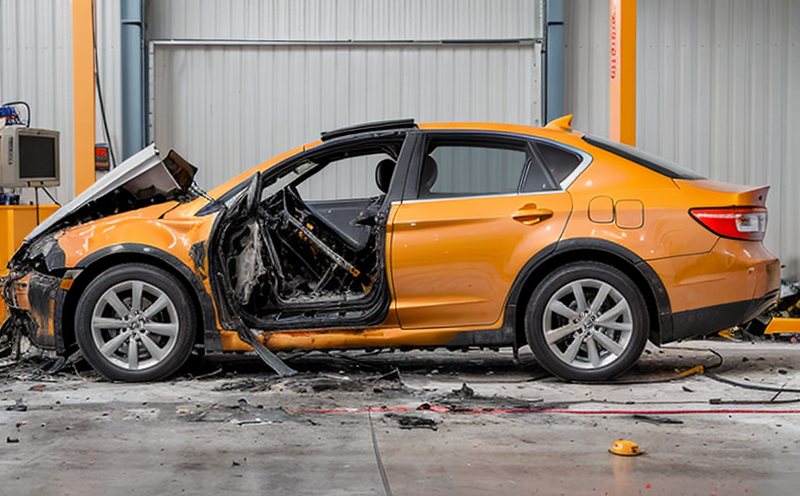IEC 62281 Mechanical Abuse Testing of Lithium Batteries During Transport
The International Electrotechnical Commission (IEC) standard IEC 62281-202 provides a framework for the mechanical abuse testing of lithium batteries used in transport applications. This service ensures that batteries are subjected to simulated real-world conditions, such as impacts and vibrations, which they may encounter during transportation.
The primary goal of this test is to evaluate the robustness and reliability of lithium batteries under harsh environmental conditions. Lithium batteries are integral components in various transport vehicles, including electric cars, buses, motorcycles, and bicycles. Ensuring their safety and performance is critical for both consumers and manufacturers.
During transportation, lithium batteries may experience mechanical stresses such as drops, impacts, vibrations, and temperature variations. These tests simulate these conditions to ensure the battery's integrity and operational capability. The IEC 62281 standard outlines specific test procedures designed to assess the battery's ability to withstand these abuses without compromising safety or performance.
The testing process involves subjecting the batteries to a series of controlled mechanical stresses, including:
- Drop tests: Batteries are dropped from specified heights onto hard surfaces.
- Vibration tests: The batteries are subjected to sinusoidal vibration forces that simulate road conditions.
- Thermal cycling: Batteries undergo rapid temperature changes between extreme cold and heat.
Each test is conducted under strict environmental control, ensuring accurate replication of real-world scenarios. Once the tests are completed, the battery's performance and safety are evaluated based on predefined acceptance criteria.
The service provided encompasses:
- Battery Preparation: Lithium batteries are prepared according to IEC standards for testing. This includes ensuring that the batteries meet all specified requirements before undergoing mechanical abuse tests.
- Testing Instrumentation: The laboratory utilizes state-of-the-art equipment capable of simulating a wide range of mechanical stresses and environmental conditions. The instrumentation ensures accurate and reliable test results.
- Data Collection & Analysis: All test data is meticulously recorded, analyzed, and reported in compliance with IEC 62281 standards. This includes detailed reports on the battery's performance before and after testing.
The acceptance criteria for this service are stringent to ensure that only batteries meeting the highest safety and quality standards pass the tests. The standard defines clear limits for acceptable levels of damage, ensuring that any defects or weaknesses in the battery design are identified early.
By adhering to IEC 62281-202, manufacturers can demonstrate compliance with international safety regulations, enhancing consumer confidence and regulatory approval. This service is essential for quality managers, compliance officers, R&D engineers, and procurement professionals who need to ensure that their products meet the highest standards of safety.
Benefits
The benefits of IEC 62281 Mechanical Abuse Testing are multifaceted:
- Enhanced Safety: By ensuring that batteries can withstand mechanical stresses, we enhance the overall safety and reliability of transport vehicles.
- Compliance with Standards: This service helps manufacturers comply with international safety regulations, enhancing consumer confidence and regulatory approval.
- Potential Cost Savings: Identifying defects early through testing can prevent costly recalls and product failures in the field.
The mechanical abuse testing of lithium batteries is crucial for ensuring that they meet the stringent requirements set by IEC 62281. This service not only protects end-users but also ensures that manufacturers maintain a high level of quality and safety standards.
Customer Impact and Satisfaction
The implementation of IEC 62281 Mechanical Abuse Testing has significant impacts on customers:
- Safety Assurance: Customers can be assured that the batteries they purchase have undergone rigorous testing, ensuring their safety during transport.
- Enhanced Reputation: Manufacturers who comply with this standard can enhance their reputation by demonstrating a commitment to quality and safety.
- Increased Customer Confidence: By ensuring product reliability through thorough testing, manufacturers can build trust with customers, leading to increased market share and customer satisfaction.
The success of this service lies in the ability to provide accurate and reliable test results that meet international standards. This ensures that both manufacturers and end-users are confident in the quality and safety of the products.
Competitive Advantage and Market Impact
The IEC 62281 Mechanical Abuse Testing service provides a significant competitive advantage:
- Regulatory Compliance: By ensuring compliance with international standards, manufacturers can operate in a regulatory-friendly environment.
- Differentiation: Offering this service distinguishes the manufacturer from competitors who may not provide such rigorous testing.
- Innovation: The ability to identify and address potential weaknesses early through testing fosters innovation and product improvement.
The market impact of this service is substantial. By ensuring that lithium batteries meet high safety standards, we contribute to the overall reliability and trustworthiness of transport vehicles. This can lead to increased demand for products from compliant manufacturers, thereby driving market growth.





